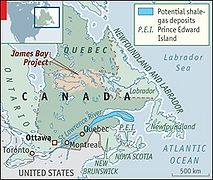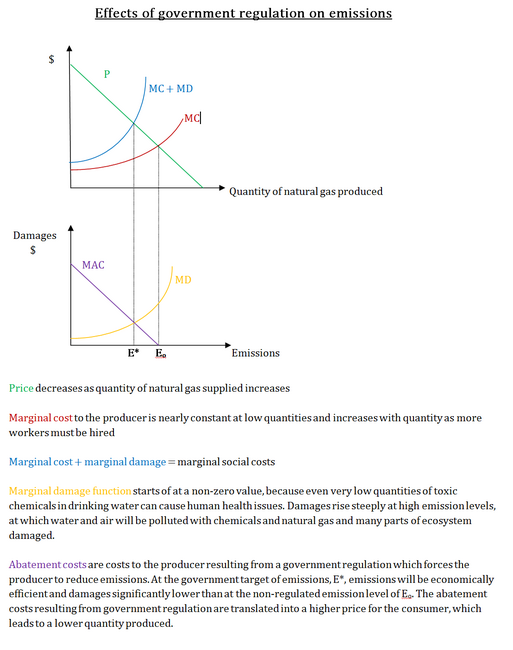Course:ECON371/UBCO2010WT1/GROUP2/Article1
Back to
Group 2: The Environmental Impacts of Natural Gas Extraction
Article 1: Exploration for natural gas causes consternation in Quebec
Summary
The news article “Exploration for natural gas causes consternation in Quebec” (published August 29, 2010 in the Globe and Mail)

describes the recent proposal in Quebec for hydraulic fracturing, which allows for the extraction of natural gas from underground. It explains how this proposal has split the town of Saint-Marc-sur-Richelieu into two camps: those who support drilling for its financial benefits and those who oppose it because of the potential risks involved.
The benefits put forth in the article in favour of hydraulic fracturing include a large increase in available employment and reduced gas prices. Furthermore, there would also be financial wealth generated from leasing property to drilling companies and other potential economic development. On the other hand, there are risks related to water pollution by the release of toxic chemicals used to extract the natural gas. Some residents oppose the proposal because they believe that the current hydro-power is more environmentally-friendly compared to natural gas.
Analysis

The issue of extracting natural gas in Quebec is a controversial one, because of a large discrepancy between private costs and benefits to the natural gas companies involved and social costs and benefits to the general public.
The private costs and benefits to the producers of natural gas are purely financial and thus easy to evaluate. Costs involve money spent on land, machinery, equipment, and workers. Benefits are the profits accrued from sale of natural gas. From the producer's point of view, total benefits must outweigh total costs; otherwise it wouldn't be meaningful to enter the market.
However, there are additional social costs, which may be the basis for protests by locals. Water pollution can affect the area’s drinking water and have negative effects upon the ecosystem and agricultural output. Furthermore, it may result in an increase in greenhouse gas emissions, in which Quebec may be unable to meet its own targets for desired reduction in greenhouse gases. The public may also negatively perceive the possible aesthetic degradation in the area, increase in noise pollution, production disasters that could affect the environment and/or employees, and the potential loss of their provincial identity as Quebec switches to a less eco-friendly power source. Since some of these costs involve human health, they may be perceived as high by the people concerned. However, since they cannot be assigned a dollar amount based on market price, it is hard to evaluate their true value. The economists analyzing this issue could use contingent valuation methods, in which respondents would be asked willingness-to-accept questions to deduce an approximate value of the possible environmental degradation. However, this would likely overstate the true social costs.
Somewhat more subtle are the additional social benefits of natural gas extraction in Quebec. An increase in provincial government revenue could result in lower taxes, which in addition to the reduced prices for natural gas and increased employment, would resonate well with the public. The increase in government revenue can also be used on the creation of public projects supporting more eco-friendly initiatives, one example being the possible conversion of buses from gasoline to natural gas, decreasing pollution emissions. Land owners would benefit by receiving lease payments from gas companies which extract gas on their property. Unlike social costs, social benefits are primarily financial and thus can be estimated more easily.
In conclusion, it appears that in this scenario, the losers can be compensated. If the government decides to give a go-ahead to natural gas companies, it will likely do so after a thorough examination and evaluation of the social costs. Quebec government is expected to construct an adequate legislation to reduce the health risks and other possible social costs associated with natural gas extraction. As such, the total social benefits of natural gas extraction will outweigh its total social costs, resulting in a net benefit for the society.
Prof's Comments
I hope that the government does conduct a thorough CBA. That does not always happen. The idea that there are costs which go beyond specific cash costs or impacts on the environment, to the idea of an identity defined by being 'green' is an interesting addition. Be careful in itemizing some benefits, as some of the ones you have are transfers - lease payments to land owners for example - and not really part of the benefits.